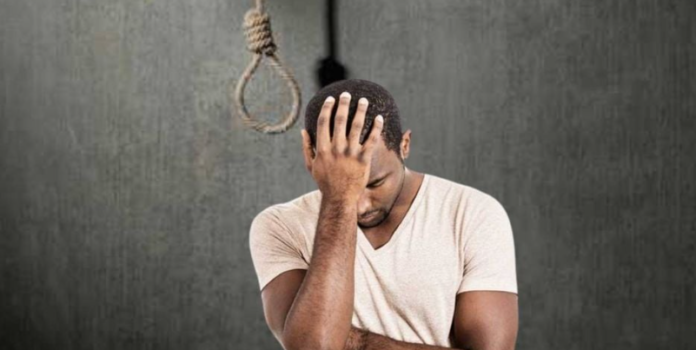By Eddy Ashioya
What you need to know:
- Whether due to stress bottled-up feelings or financial distress, we are reaching the state in our country where men’s mental health is at critical mass.
- The recent trend points to a shaken soda can, a disparate yet desperate community at the cliff of a fully-fledged mental health crisis
Habibi, I am glad you survived the lovemaggedon that was Valentine’s Week. I hope you met your girlfriend. I also hope your girlfriend didn’t meet your girlfriend. I read a recent statistic that said, on average, a Kenyan man has seven sexual partners in his life while a woman has two and I remembered Jose Camargo telling us that numbers don’t lie.
So who is lying here? But if my quantitative skills lecturer is right, then, “statistics are like bikinis. What they reveal is suggestive but what they conceal is vital.” Do you know what is Kenya’s highest-ranked fetish? Fisting. But that is not why you bought a national newspaper.
These are the things we don’t talk about. The things we shhh and hum and sweep under the Gikomba carpet until men of a certain age—some 50-year-old parliamentarian or a 69-year-old man, die in a lodging in Mlolongo leaving a 20-something-year-old girl unsatisfied. Our society does not pay ear to such embarrassing chatter, the elders will spit in their chests and curse you.
RELATED
- NJENGA: Is the economy affecting Kenyans’ mental state?Wellness & Fitness Feb 12
- International Men’s Day: Don’t kill yourself, talk to an expert, elderGender Nov 19
Society’s rules are also what has gotten us here. Here is a state of alarming numbers of mental breakdowns, especially among men. There is a collective tension in the air, every other week is a suicide splashed on social media, and other times, a trifle that ends in an impassioned murder-suicide. The government seems clueless, the experts are finger-wagging and the victims are caught in the crossfire. Men are three times as likely to commit suicide in Kenya as women.
Read: Taking misfortune in your stride
Whether due to stress bottled-up feelings or financial distress, we are reaching the state in our country where men’s mental health is at critical mass. The recent trend points to a shaken soda can, a disparate yet desperate community at the cliff of a fully-fledged mental health crisis. Who is in charge? With 70,000 Kenyans losing jobs in the last year, and men still feeling the pressure of being providers in their relationships, we are in for a ticking time bomb.
The advice strewn everywhere is nothing but fridge magnet wisdom: Men should open up more. Start a side hustle. Practice mindfulness. Of the three, I am most revolted by the idea of practicing mindfulness. And I don’t mean to sound dismissive, but I am not buying into this church, or their religion of sitting quietly and focusing on our breathing or whatever. This can also include bailing on plans with friends to “protect our energy”—which, depending on who you ask, is or isn’t sensible. Never in our hyperconnected world have we been so disconnected, with society’s clarion call being “a lone wolf.”
In my experience, I have seen it is better to be in a community than without. Don’t isolate. Be around people, work with people. It makes the world feel bigger—and your problems smaller. It is important that as men we invest in community, be it at church, work, or even a football team, like the mighty, mighty Arsenal.
Read: Why it is a friendless season for men
The truth is that there is a dearth of community and a social vacuum. The usual family meetings that used to happen in the past in the villages have slowly dried up, and a generation of men has grown up cut loose from the web of cousins and uncles and aunties and lifelong neighbours who traditionally played the role of guardians, but also guide; family but also friend. Men today are less in rebellion against society than ignorant of it. And this has been the stick with which they are beaten— “Why don’t you just open up?” and when they do, they are told, “No, not like that. You are a man. Be a man.”
It is no wonder most men are experiencing existential crises that maybe life has no meaning. And if life has no meaning, then why go on living? This is the seed that stems all anxiety. Growing up, it must have been in high school or university, and the teachers loved to talk about The Myth of Sisyphus, where Albert Camus cited absurdity as a symptom of modern spiritual discomfort, wondering if maybe suicide is the only rational response when man’s need for rationality is at loggerheads with the random structure of reality.
Sisyphus was cursed by the gods to roll a rock up to the top of a mountain, only to have the rock roll back down to the bottom every time he reached the top. Futile labour. Sisyphus punishment was to endure an eternity of hopeless struggle. But then Camus argues that it only looks hopeless because we contrast it with something else that seems preferable. Life itself is a futile struggle devoid of hope. This should not chain us, but instead, liberate us.
Like Sisyphus, the punishment is only a punishment if you hope for something better. Or in Gen Z slang, it’s only embarrassing if you are embarrassed. Thus, if you learn to embrace, or at least tolerate, the utter weirdness of your existence, life will seem much simpler. As Sisyphus embraces his situation, we imagine him happy, and, in turn, are happy through him, and on we go, pushing our boulder up the mountain every day.
I don’t know what boulder you are pushing, brother, but the world could use one more man in this world. Err on the side of presence. This year you walk the path of the tormented. Perhaps, next year it will be me. Perhaps there is nothing else to do than be kind and fill our internal emptiness with the love of friends and family. Perhaps it is picking up the phone and making that call or sending that text to that man in your life and asking, “How are you really doing?”
eddieashioya@gmail.com





